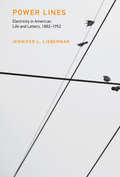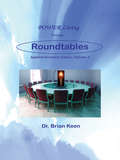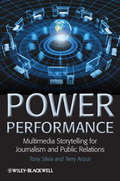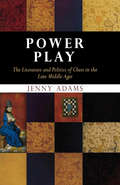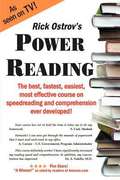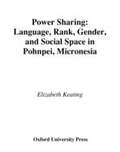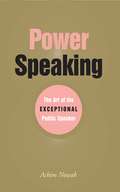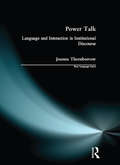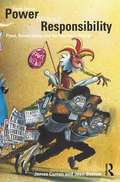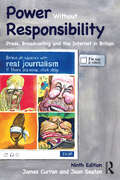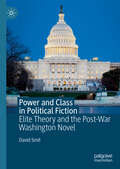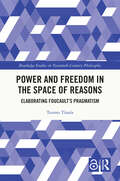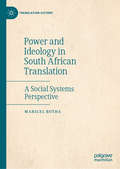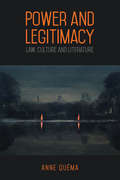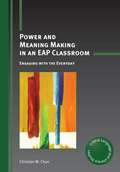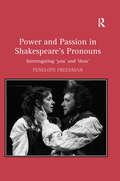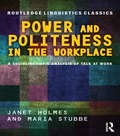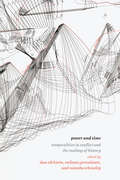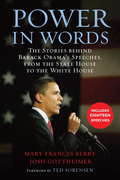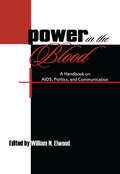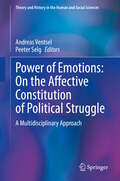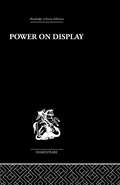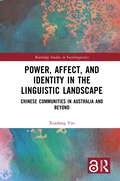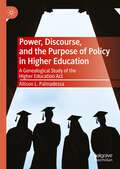- Table View
- List View
Power Lines: Electricity in American Life and Letters, 1882-1952 (Inside Technology)
by Jennifer L. LiebermanHow electricity became a metaphor for modernity in the United States, inspiring authors from Mark Twain to Ralph Ellison.At the turn of the twentieth century, electricity emerged as a metaphor for modernity. Writers from Mark Twain to Ralph Ellison grappled with the idea of electricity as both life force (illumination) and death spark (electrocution). The idea that electrification created exclusively modern experiences took hold of Americans' imaginations, whether they welcomed or feared its adoption. In Power Lines, Jennifer Lieberman examines the apparently incompatible notions of electricity that coexisted in the American imagination, tracing how electricity became a common (though multifarious) symbol for modern life. Lieberman examines a series of moments of technical change when electricity accrued new social meanings, plotting both power lines and the power of narrative lines in American life and literature. While discussing the social construction of electrical systems, she offers a new interpretation of Twain's use of electricity as an organizing metaphor in A Connecticut Yankee in King Arthur's Court, describes the rhetoric surrounding the invention of electric execution, analyzes Charlotte Perkins Gilman's call for human connection in her utopian writing and in her little-known Human Work, considers the theme of electrical interconnection in Jack London's work, and shows how Ralph Ellison and Louis Mumford continued the literary tradition of electrical metaphor. Electrical power was a distinctive concept in American literary, cultural, and technological histories. For this reason, narratives about electricity were particularly evocative. Bridging the realistic and the romantic, the historical and the fantastic, these stories guide us to ask new questions about our enduring fascination with electricity and all it came to represent.
Power Living Through Roundtables: Applied Business Ethics
by Brian KeenPower LivingThroughRountables is the third book in the Applied Business Ethics series. Roundtables have beem viewed most often as relating to King Arthur and the Knights of the Roundtable. You will discover the actual meaning of Roundtable, and why it is far more than a round table. You will learn how a Roundtable is the best methodology for networking. Networking skills will enhance your potential for building your business. Specific networking tools are presented in the books to assist you in growing your business. Utilizing the scientifically-verifiable data you can start through knowing whether your business is really a micro-, small-, medium-, or large-business. Many owners especially small business owners, think that they have small-business when they reakky are a micro-business. For people interested in a new profession observe the benefits of the CGE professional designation. CGEs can assist your business to grow.
Power Performance: Multimedia Storytelling for Journalism and Public Relations
by Tony Silvia Terry AnzurThis book is a unique and definitive guide to the skills necessary for on-camera journalism and offers an invaluable behind-the-scenes look at the profession. Tailors the traditional skills of writing, reporting, and producing to the needs of journalists working in front of the camera Includes chapters devoted to the role of the storyteller, reporting the story across multiple platforms, and presenting the story on-camera Incorporates profiles of leading multimedia journalists and public relations practitioners Addresses the key ethical issues for the profession Offers practical advice for putting presentation skills to work Storytelling skills covered can be applied to a variety of traditional and new media formats including television news, radio, and podcasts
Power Play
by Jenny AdamsThe game of chess reached western Europe by the year 1000, and within several generations it had become one of the most popular pastimes ever. Both men and women, and even priests played the game despite the Catholic Church's repeated prohibitions. Characters in countless romances, chansons de geste, and moral tales of the eleventh through twelfth centuries also played chess, which often symbolized romantic attraction or sexual consummation.In Power Play, Jenny Adams looks to medieval literary representations to ask what they can tell us both about the ways the game changed as it was naturalized in the West and about the society these changes reflected. In its Western form, chess featured a queen rather than a counselor, a judge or bishop rather than an elephant, a knight rather than a horse; in some manifestations, even the pawns were differentiated into artisans, farmers, and tradespeople with discrete identities.Power Play is the first book to ask why chess became so popular so quickly, why its pieces were altered, and what the consequences of these changes were. More than pleasure was at stake, Adams contends. As allegorists and political theorists connected the moves of the pieces to their real-life counterparts, chess took on important symbolic power. For these writers and others, the game provided a means to figure both human interactions and institutions, to envision a civic order not necessarily dominated by a king, and to imagine a society whose members acted in concert, bound together by contractual and economic ties. The pieces on the chessboard were more than subjects; they were individuals, playing by the rules.
Power Reading: The Best, Fastest, Easiest, Most Effective Course on Speedreading and Comprehension Ever Developed! (3rd Edition)
by Rick OstrovPower Reading is the best, fastest, easiest, most effective speedreading and comprehension course ever developed! Most people see amazing results in the first few days of the 30-day Power Reading course. Included in this unique speedreading course are the most effective techniques for comprehension improvement, study, note taking, test taking and retention in school, work or pleasure materials.<p><p> Rick Ostrov has spent years teaching, working with and researching the top speedreading programs from around the world. Throughout his more than 30 years of instructing and research, personally teaching thousands of professionals, students, educators and families, he has distilled the most effective techniques into his Power Reading course.<p> Power Reading is totally different than any other program because it teaches you in your own material while you actually study or read for school, work or for your own enjoyment!<p> The Power Reading course focuses on increasing comprehension and study and technical reading skills, as well as teaching people how to read faster. Emphasis is placed on understanding and being able to use information as well as speedreading. Included are the most up to date and effective techniques for study, note taking, test taking, presentation and retention.<p> Power Reading, as thousands of successful students have discovered, is the most effective speedreading and comprehension course ever developed!
Power Sharing: Language, Rank, Gender and Social Space in Pohnpei, Micronesia
by Elizabeth KeatingLinguistic anthropologist Elizabeth Keating went to the island of Pohnpei, in Micronesia, and studied how people use language and other semiotic codes to reproduce and manipulate status differences.
Power Speaking: The Art of the Exceptional Public Speaker
by Achim NowakIntegrating key concepts and ideas about public speaking into a clear, step-by-step, transformational method, Power Speaking teaches emerging speakers how to grow the necessary skills and unleash their inner power. Divided into proficiency levels-mastering the basics, making the connection, and polishing the core-this guide allows speakers to conquer public speaking systematically. Readers start with the use of voice and body movements, then move on to learn the use of personal stories, intent listening, and positioning or reframing a topic.
Power Talk: Language and Interaction in Institutional Discourse (Real Language Series)
by Joanna ThornborrowThe concept of social power, who holds it and how they use it is a widely debated subject particularly in the field of discourse analysis, and the wider arena of sociolinguistics. In her new book,Joanna Thornborrow challenges the received notion that power is necessarily held by some speakers and not by others. Through the detailed analysis of communication and interaction within a range of institutional settings, she examines power as an emerging, negotiated phenomenon between participants with different status and goals. Written in a clear style which combines attention to technical detail with accessibility, Power Talk includes: a comprehensive introduction to the theme of power including the analytic approaches to power in language a wide-ranging discussion of theory and practice and, in-depth contemporary case studies. Power Talk is the first book to focus on the topic of power in situated interaction across a range of contexts. As such, it makes a timely, and important contribution to the debate surrounding social power and language use, and will be of value to both students and researchers alike.
Power Without Responsibility: Press, Broadcasting and the Internet in Britain
by James Curran Jean SeatonThis book attacks the conventional history of the press as a story of progress; offers a critical defence and history of public service broadcasting; provides a myth-busting account of the internet; a subtle account of the impact of social media and explores key debates about the role and politics of the media. It has become a standard book on media and other courses: but it has also gone beyond an academic audience to reach a wider public. Hailed as ‘a classic of media history and analysis’ by the Irish Times and a book that has ‘cracked the canon’ by the Times Higher, it has been translated into five languages. This edition contains six new chapters. These include the press and the remaking of Britain, the rise of the neo-liberal Establishment, the moral decline of journalism, the impact of social media and a history of attempts to reform the press. It contains new research on the relationship between programmes, institutions and society. It places key UK institutions in the wider context of international affairs and their impact. The book has been updated to take account of new developments like Brexit and the rise of Jeremy Corbyn and the shift in authority and legitimacy prompted by social media. It does this with a clear explanation of how policy can shape media outcomes.
Power Without Responsibility: Press, Broadcasting and the Internet in Britain
by James Curran Jean SeatonThis book attacks the conventional history of the press as a story of progress; offers a critical defence and history of public service broadcasting; provides a myth-busting account of the internet; gives a subtle account of the impact of social media; and explores key debates about the role and politics of the media.Power Without Responsibility has become a standard textbook on media and other courses, but it has also gone beyond an academic audience to reach a wider public. Hailed as a book that has ‘cracked the canon’ by the Times Higher Educational Supplement, it has been translated into five languages. In 2019, it was awarded the International Communication Association's Fellows Book Award. This ninth edition is based on a major overhaul of its content to take account of new developments (such as generative AI) and new scholarship in the field. It also contains a new chapter on the transformed opportunity for a reformed and buccaneering public service broadcasting in the face of automated misinformation and social division, locally, nationally and internationally.This trailblazing text is essential reading for all students and scholars interested in British media and contemporary media and society.
Power and Class in Political Fiction: Elite Theory and the Post-War Washington Novel
by David SmitThis book introduces Elite Theory to the literary study of class as a framework for addressing issues of the nature of governance in political fiction. The book describes the historical development and major tenets of Elite Theory, and shows how each of four post-war Washington novels—Gore Vidal’s Washington, D.C.; Allen Drury’s Advise and Consent; Joan Didion’s Democracy; and Ward Just’s Echo House—illustrates the way class-based political elites exhibit forms of “ruling-class consciousness” and maintain their legitimacy in an ostensibly democratic form of government by promoting themselves as models of behavior, promulgating an ideology that justifies their rule through their control of the media, and accepting new members from the lower classes. Reading these novels through a socio-political lens, David Smit offers suggestions for ways to work for a more just and equitable society in light of what this analysis reveals about the “culture” that produces our political elites.
Power and Freedom in the Space of Reasons: Elaborating Foucault’s Pragmatism (Routledge Studies in Twentieth-Century Philosophy)
by Tuomo TiisalaThis book argues that the received view of the distinction between freedom and power must be rejected because it rests on an untenable account of the discursive cognition that endows individuals with the capacity for autonomy and self-governed rationality. In liberal and Kantian approaches alike, the autonomous subject is a self-standing starting point whose freedom is constrained by relations of power only contingently because they are external to the subject’s constitution. Thus, the received view defines the distinction between freedom and power as a dichotomy. Michel Foucault is arguably the most important critic of that dichotomy. However, it is widely agreed that Foucault falls short of justifying the alternative view he develops, where power and freedom are essentially entangled instead. The book fills out the gap by investigating the social preconditions of discursive cognition. Drawing on pragmatist-inferentialist resources from the philosophy of language (Wittgenstein, Sellars, and Brandom), it presents a new interpretation of Foucault’s philosophy that is unified by his overlooked idea of “the archaeology of knowledge.” As a result, the book not only explains why and how power and freedom must be entangled but also what it means ethically to pursue and gain autonomy with respect to one’s own understanding. Power and Freedom in the Space of Reasons will appeal to scholars and advanced students working in social and political philosophy, critical theory, ethics, philosophy of language, and the history of 20th-century philosophy.The Open Access version of this book, available at www.taylorfrancis.com, has been made available under a Creative Commons Attribution-Non Commercial (CC-BY-NC) 4.0 license.Any third party material in this book is not included in the OA Creative Commons license, unless indicated otherwise in a credit line to the material. Please direct any permissions enquiries to the original rightsholder.This research was funded in whole or in part by the Austrian Science Fund (FWF) [10.55776/COE3]. For open access purposes, the author has applied a CC BY-NC public copyright license to any author-accepted manuscript version arising from this submission.Published with the support of the Austrian Science Fund (FWF): 10.55776/PUB1157
Power and Ideology in South African Translation: A Social Systems Perspective (Translation History)
by Maricel BothaThis book provides a social interpretation of written South African translation history from the seventeenth century to the present, considering how trends involving various languages have reflected ideologies and unequal power relations and focusing attention on translation’s often hidden social operation. Translation is investigated in relation to colonial mercantilism, scientific knowledge of extraction, Christian missionary conversion, Islamic education, various nationalisms, apartheid oppression and the anti-apartheid struggle, neoliberalism, exclusion and post-apartheid social transformation by employing Niklas Luhmann’s social systems theory. This book will be an essential resource for scholars, graduate students, and general readers who are interested in or work on the history and practice of translation and its cultural agents in the South African context.
Power and Legitimacy
by Anne QuémaAn interdisciplinary analysis of the ways in which symbolic acts create social norms, Power and Legitimacy is an important contribution to the growing body of scholarship on law and literature. Drawing on the theoretical insights of Judith Butler and Pierre Bourdieu, Anne Quéma demonstrates the effect of symbolic violence on the creation of social and political legitimacy.Examining modern jurisprudence theory, statutory law, and the family within the modern Gothic novel, Quéma shows how the forms and effects of political power transform as one shifts from discourse to discourse. An impressive integration of the scholarship in these three fields, Power and Legitimacy is a thought-provoking analysis of the basis of power and the law.
Power and Meaning Making in an EAP Classroom
by Christian W. ChunThis book examines how critical literacy pedagogy has been implemented in a classroom through a year-long collaboration between the author (a researcher) and an EAP teacher. It details the teacher's introduction to functional grammar and accompanying critical literacy approaches to EAP, and her growing critical language and discourse awareness of power and meaning making in the classroom. The book traces her evolving classroom practices and addresses how powerful discourses in social circulation found their way into the classroom via the curriculum materials the students encountered. The main themes of the book are threefold: narrowing the divide between critically-oriented researchers and practitioners; how critical literacy is actually implemented in a teacher's classroom; and how people (students and the teacher) engage in and with the representations and discourses of the everyday world that include neoliberal globalization, racial and cultural identities, and consumerism. It will be of interest to both researchers and practitioners for the ethnographic and pedagogical issues it raises as well as its accessible theoretical frameworks illustrated by relevant classroom interactional data, mediated, multimodal and critical discourse analysis.
Power and Passion in Shakespeare's Pronouns: Interrogating 'you' and 'thou'
by Penelope FreedmanIn revealing patterns of you/thou use in Shakespeare's plays, this study highlights striking and significant shifts from one to the other. Penelope Freedman demonstrates that understanding of the implications of you/thou use in early modern English has been bedevilled by overconcern with issues of power and status, and her careful research, analysing all the plays, reveals how a fuller understanding of Shakespeare's usage can provide a key to unlock puzzles of motive and character, and a glass to clarify relationships and emotions. The work focuses particularly on dialogue between men and women, and sheds new light on male and female language use. The scholarship presented in this volume is augmented with tables and a glossary of linguistic terms.
Power and Politeness in the Workplace: A Sociolinguistic Analysis of Talk at Work (Routledge Linguistics Classics)
by Janet Holmes Maria StubbePower and Politeness in the Workplace has become established as a seminal text for courses in language and professional communication. Co-authored by bestselling author Janet Holmes, this text provides insights into the way we all talk at work, including a wealth of material illustrating the way people communicate with each other in their ordinary everyday encounters in their workplaces. The analysis focuses, in particular, on how and why people "do" power and politeness in the workplace, and examines the discourse strategies involved in balancing the competing demands of meeting workplace objectives and getting things done on time with maintaining good collegial workplace relationships. Drawing on a large and very varied corpus of data collected in a wide range of workplaces, the authors explore specific types of workplace talk, such as giving advice and instructions, solving problems, running meetings and making decisions. Attention is also paid to the important contribution of less obviously relevant types of workplace talk such as humour and small talk, to the construction of effective workplace relationships. In the final chapter some of the practical implications of the analyses are identified. This Routledge Linguistics Classic is here reissued with a new preface from the authors, covering the methods of analysis, an update on the Language in the Workplace project and a look at the work in the context of recent research. Power and Politeness in the Workplace continues to be a vital read for researchers and postgraduate students in the fields of applied linguistics and communication studies.
Power and Time: Temporalities in Conflict and the Making of History
by Dan Edelstein Stefanos Geroulanos Natasha WheatleyTime is the backdrop of historical inquiry, yet it is much more than a featureless setting for events. Different temporalities interact dynamically; sometimes they coexist tensely, sometimes they clash violently. In this innovative volume, editors Dan Edelstein, Stefanos Geroulanos, and Natasha Wheatley challenge how we interpret history by focusing on the nexus of two concepts—“power” and “time”—as they manifest in a wide variety of case studies. Analyzing history, culture, politics, technology, law, art, and science, this engaging book shows how power is constituted through the shaping of temporal regimes in historically specific ways. Power and Time includes seventeen essays on human rights; sovereignty; Islamic, European, Chinese, and Indian history; slavery; capitalism; revolution; the Supreme Court; the Anthropocene; and even the Manson Family. Power and Time will be an agenda-setting volume, highlighting the work of some of the world’s most respected and original contemporary historians and posing fundamental questions for the craft of history.
Power in Words
by Mary Frances Berry Josh Gottheimer Theodore C. SorensonWhatever his ratings, Obama remains personally popular, widely acknowledged for his soaring oratory. His words were one of the lasting legacies of his presidential campaign and are proving to be among his most effective governing weapons. In Power in Words, distinguished historian and civil rights activist Mary Frances Berry and former presidential speechwriter Josh Gottheimer introduce Obama's most memorable speeches, from his October 2002 speech against the war in Iraq and his November 2008 election-night victory speech to "A More Perfect Union," his March 2008 response to the Reverend Wright controversy, and lesser-known but revealing speeches, such as one given in Nairobi, Kenya, in August 2006. For each speech, Berry and Gottheimer add a rich introduction that includes political analysis, provides insight and historical context, and features commentary straight from the speechwriters themselves--including Jon Favreau, Obama's chief speechwriter, and several other Obama campaign writers. Compelling and enduring,Power in Words delivers the behind-the-scenes account of Obama's rhetorical legacy and is a collection to relish for years to come.
Power in the Blood: A Handbook on Aids, Politics, and Communication (Routledge Communication Series)
by William N. ElwoodIn this single volume, William N. Elwood has gathered potent evidence of the impact that the HIV/AIDS epidemic has had on the world, its communities, and its inhabitants, and he addresses the role of communication in affecting the way in which people respond to AIDS. With a multidisciplinary group of contributors and topics ranging from political rhetoric to interpersonal discourse, Power in the Blood offers a multitude of ways in which to think about power, politics, HIV prevention, and people living with HIV. Readers will be able to use this information in class discussions, program designs, grant applications, and research, as well as in their own lives. With this volume, Elwood makes a thoroughly convincing argument that communication is the key to understanding, treating, and preventing AIDS, and he inspires further action toward the goal of ending the AIDS crisis.
Power of Emotions: A Multidisciplinary Approach (Theory and History in the Human and Social Sciences)
by Andreas Ventsel Peeter SelgThe emergence of political identities and communities in (social) media is largely driven by affective responses to current events—a tendency facilitated by the dominance of emotionally and visually oriented communication. However, this mode of community formation leads, first, to the inherent instability and transience of these groups and, second, to the oversimplification of complex socio-political issues into binary, yes/no alternatives. Within this framework, deliberation and argumentation-based problem-solving become increasingly difficult, as discourse is supplanted by emotional reactions that position individuals either &“for&” or &“against&” an issue. Particularly significant is the role of affect and emotion in communication during times of crisis—whether in the context of migration, the COVID-19 pandemic, or the war in Ukraine. This affective role is evident in the anchoring of public discourse to personal emotions and the generation and dissemination of hashtags and tags that consolidate diverse phenomena under a unified label. Such collective identity coalesces around connective action, which is primarily driven either by opposition to the established order or by the reinforcement of a preexisting system&’s foundations. Consequently, the emergence of these affective publics must be analyzed within the broader context of power dynamics and evolving forms of identification in the contemporary media sphere—forms rooted in shared practices of expression, action, and interpretation. This edited volume will explore the manifestations of affective semiosis (meaning-making) at the socio-cultural and discursive levels. Cultural context, emotional reactions, and affective semiosis play a crucial role in shaping how issues related to identity and security are articulated in both domestic and foreign policy, as well as in the ways solutions to these challenges are sought. By adapting the concept of affective semiosis for the analysis of discursive structures, this volume offers an innovative and effective approach to identifying the triggers of emotional reactions in discourse and examining their impact on the construction of political identities, fear scenarios, misinformation campaigns, polarization, and other dynamics within networked societies. The volume includes both theoretically oriented papers as well as analyses of empirical materials.
Power of Scandal
by P. Johannes Ehrat, SJAre there events that are inherently scandalous? Power of Scandal finds that the very idea of 'scandal' is derived not from an event, but from public opinion - which, in turn, is construed by media narratives. Scandal is powerful because of its ability to challenge institutions by destabilizing their legitimacy. The media plays an integral role in the creation of scandal because it interprets real events as purposeful actions for the public. Examining the ubiquity of scandals in today's mass media, Johannes Ehrat's conclusions are fresh and surprising.Ehrat applies classic semiotic and pragmatic thought to contemporary media issues, mainly moralist discourse from sex abuse cases to the phenomenon of televangelism. Arguing that sociological and communications studies of scandal have ignored the media's constructed nature, Ehrat focuses on how meaningful public narrative is produced. By examining the parallel worlds of media and public opinion, Power of Scandal uses an alternative heuristic for understanding mass communication that is both rigorous and sophisticated.
Power on Display: The Politics of Shakespeare's Genres
by Leonard TennenhouseFirst published in 1986. 'Impressively open to the complexity of cultural discourses, to the ways in which one discursive form may function as a screen for another above all to the political entailment of genre.' Stephen Greenblatt.What is the relation between literary and political power? How do the symbolic dimensions of social practice and the social dimensions of artistic practice relate to one another? Power on Display considers Shakespeare's progression from romantic comedies and history plays to tragedy and romance in the light of the general process of cultural change in the period.
Power, Affect, and Identity in the Linguistic Landscape: Chinese Communities in Australia and Beyond (Routledge Studies in Sociolinguistics)
by Xiaofang YaoUncovering the complexity of linguistic diversity and semiotic creativity, this book examines the issues of power, affect, and identity in both physical and digital linguistic landscapes.Based on fieldwork with various Chinese communities in Australia, the book offers unique insights into the uses of languages, semiotic resources, and material objects in public spaces, and discusses the motives and ideologies that underline these linguistic and semiotic practices. Each chapter frames the sociolinguistic issue emerging from the linguistic landscape under investigation and shows readers how the personal trajectories of individuals, the availability of semiotic resources, and the historicity of spaces collectively shape the meanings of publicly displayed language items in offline and online spaces. Supported by a wealth of interviews, media, and archival data, the book not only advances readers’ understanding of how linguistic landscape is structured by various historical, political, and sociocultural factors, but also enables them to reimagine the linguistic landscape through the lens of emerging digital methods.This book is an ideal resource for researchers, advanced undergraduates, and graduate students of applied linguistics and sociolinguistics who are interested in the latest advances in linguistic landscape research within virtual and material contexts.
Power, Discourse, and the Purpose of Policy in Higher Education: A Genealogical Study of the Higher Education Act
by Allison L. PalmadessaThis book traces the full history of the Higher Education Act of 1965 in its entirety, to the present. The fifty-six-year history of this landmark legislation is analyzed as a genealogical phenomenon through multiple methodological and theoretical frameworks. This allows the researcher to study the Act not in a linear or single approach, rather the blend of lenses and methods creates a means to study policy-making as a site of ideological reproduction and results in the exposure of power dynamics that obfuscate the hidden agenda by those in positions of power.
